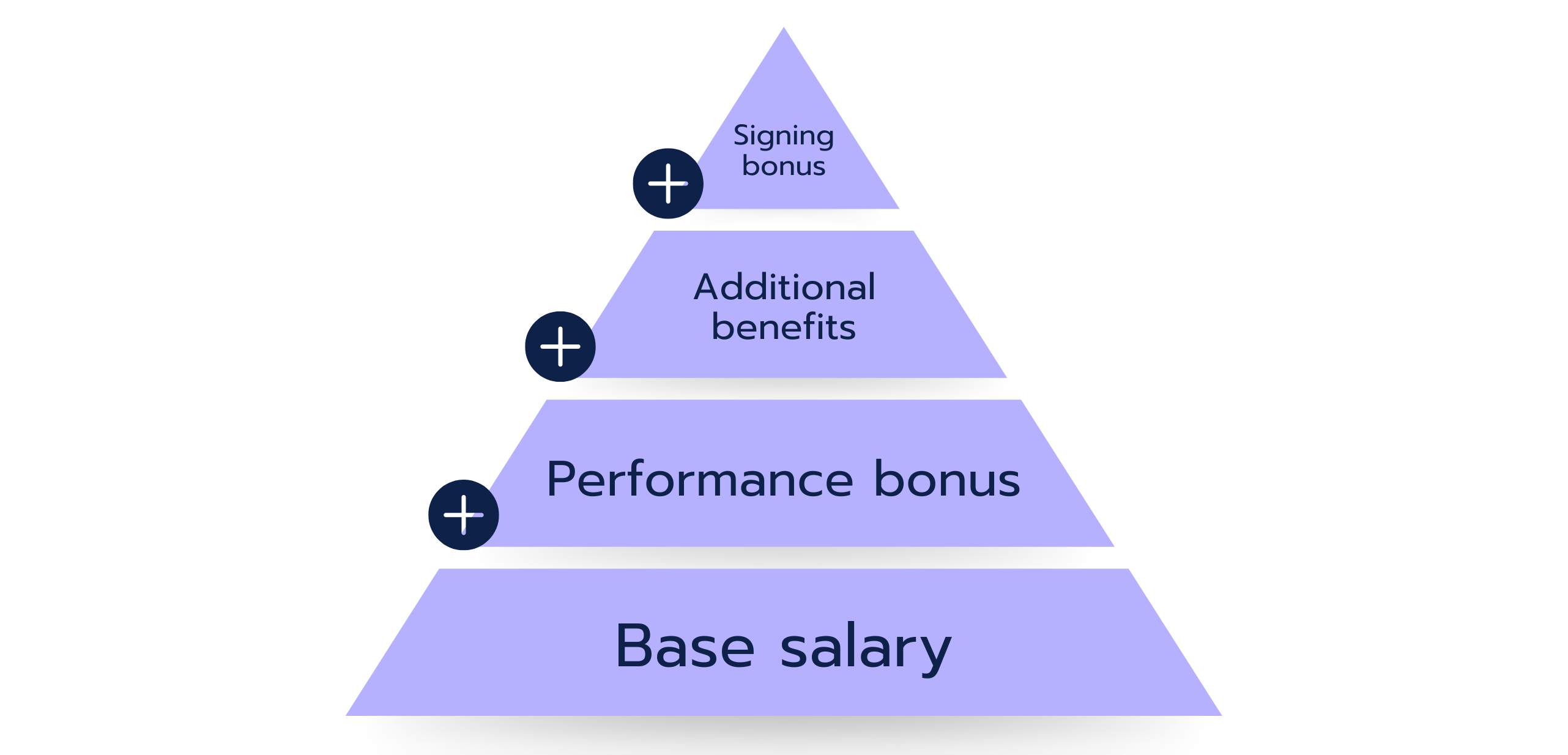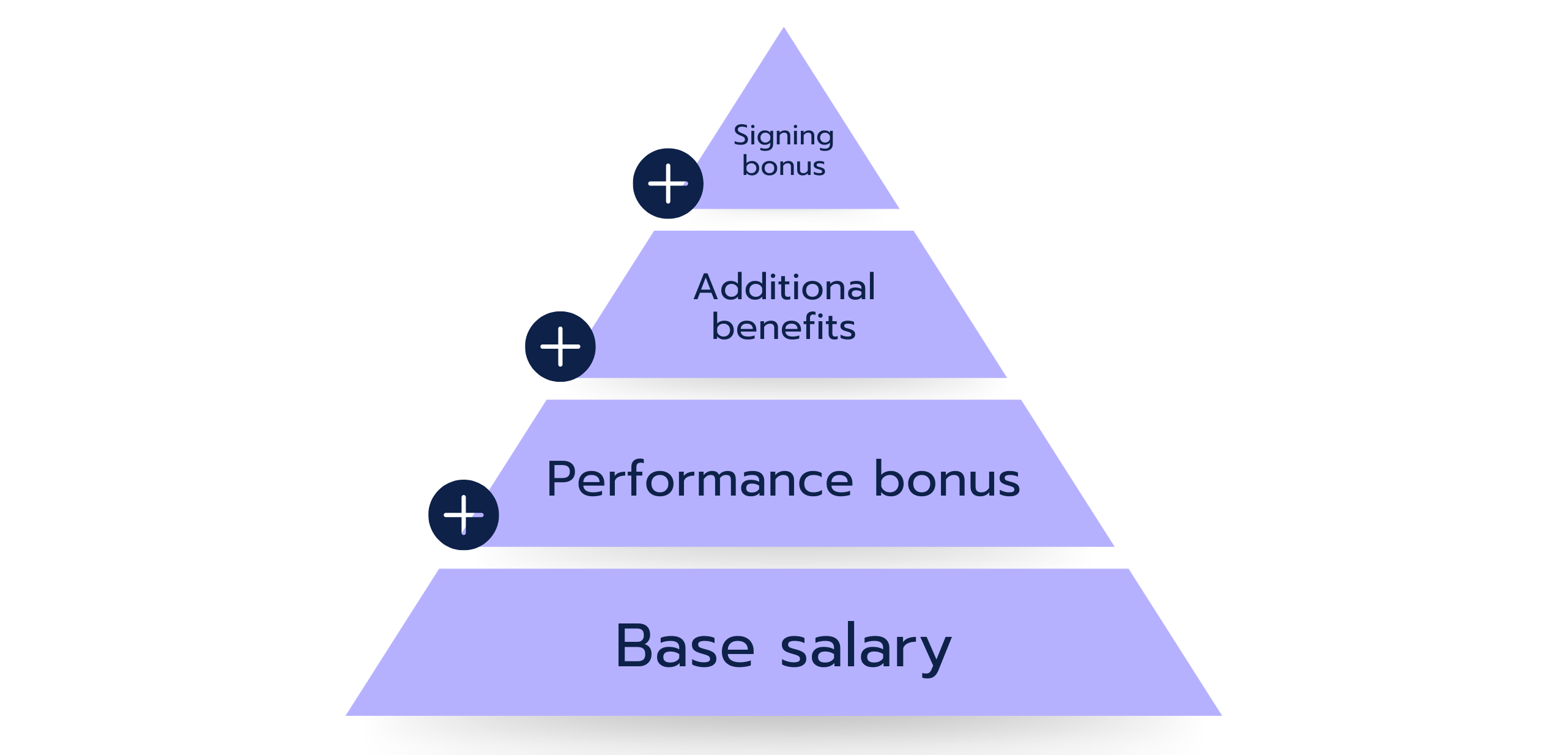For many graduates, in addition to prestige and a wide range of projects, salary is the main deciding factor when choosing a career in consulting. But what starting salaries are actually possible in management consulting in the DACH region, and what exactly does a consultant's salary package consist of? We have looked at numerous salary reports and provide you with the answers!
Consulting Salaries in DACH 2025 - How Much Can You Earn?
How Are Salaries Structured in Consulting?
The salary structure in consulting typically consists of several key components:


Base Salary in Consulting
The base salary (or fixed salary) is the most stable compensation component in management consulting. It represents the regular payment that goes into your account at the end of each month. Depending on career level, position, prestige, and the size of the firm, the base salary can vary significantly. In absolute terms, your fixed amount increases as you climb the career ladder. However, relative to your total compensation, the variable component usually becomes more significant with increasing responsibility, and you are rewarded based on your performance. Renowned consulting firms such as Roland Berger, Oliver Wyman, or Kearney generally offer higher base salaries due to their market position and financial strength compared to smaller, less-known boutique consultancies. Negotiations typically revolve around annual gross salaries.
Performance Bonus in Consulting
To motivate employees and reward outstanding results, the payment of a performance bonus (or incentive bonus) is widespread in consulting. The basis for this special payment can include various components such as company and project successes, client evaluations, and individual or team-oriented performance assessments.
Unlike the base salary, the performance bonus is not paid monthly but on a quarterly or annual basis. The performance evaluation usually accompanies an employee discussion, allowing you to understand the exact basis for determining the bonus amount.
Here is an overview of performance bonuses in the DACH region (Germany, Austria, Switzerland):
| Country | Average | Median (50th %) | Maximum (Top %) |
| Germany | €5,000 - €10,000 | €7,500 | €20,000 |
| Austria | €4,000 - €11,000 | €7,500 | €18,000 |
| Switzerland | CHF 7,000 - CHF 16,000 (€7,300 - €16,000) | CHF 11,500 (€12,000) | CHF 25,000 (€26,000) |
| Country | Average | Median (50th %) | Maximum (Top %) |
| Germany | €5,000 - €10,000 | €7,500 | €20,000 |
| Austria | €4,000 - €11,000 | €7,500 | €18,000 |
| Switzerland | CHF 7,000 - CHF 16,000 (€7,300 - €16,000) | CHF 11,500 (€12,000) | CHF 25,000 (€26,000) |
In Germany, consultants can expect bonuses or incentives ranging from €5,000 to €20,000 per year, depending on the company and position. Large consulting firms often offer more attractive bonus programs than smaller firms, especially for senior consultants or partners.
Similarly, bonus payments in Austria vary depending on the company and role. Consultants can anticipate additional payments ranging from €4,000 to €18,000, with specialized or senior consultants potentially receiving higher bonuses.
Due to the generally higher salary levels in Switzerland, bonus payments are often higher as well. Consultants in Switzerland may receive bonuses ranging from CHF 7,000 (€7,300) to CHF 25,000 (€26,000) or even more, depending on their position and the company's success.
Bonuses and incentives can constitute a significant portion of overall income in consulting. They not only provide a financial incentive for outstanding performance but also reflect the value that consultants bring to their companies. If you are considering a career in consulting, it's essential to consider not only the base salary but also variable compensation to get a complete picture of your earning potential.
Additional Benefits in Consulting
Additional benefits refer to non-monetary perks that contribute significantly to the total compensation package. These may include offerings such as company pension plans, supplementary insurance, company cars, subsidies for public transportation passes, or contributions to commuting costs. Many companies also reimburse education expenses to support the professional development of their employees. While these additional benefits may not directly impact your salary, they can significantly enhance your overall package, making a career in the consulting industry particularly attractive.
Signing Bonus in Consulting
In consulting, a signing bonus is commonly offered during new hires. This is a one-time payment at the start of the employment relationship to attract new talents. The consulting industry competes fiercely for the best talent, and the signing bonus serves as a signal of commitment to recruitment efforts. As a candidate, the signing bonus adds an extra incentive when deciding on the right company to join.
Which Factors Influence Salary in Consulting?
Three main factors play a crucial role in determining salaries in consulting: the company, the position, and the location. Your earning potential is strongly influenced by these factors, making it worthwhile to delve into the details.


Why The Company is Crucial
Your salary heavily depends on the consulting company you work for. Prestigious brands like McKinsey, BCG, and Bain (MBB) fiercely compete for the same candidates and accordingly offer competitive salaries. Recognizing that their employees are their most valuable asset, these globally renowned top consulting firms are willing to invest significantly in their personnel, thanks to their corresponding financial resources.
Besides brand recognition, the size of the company also plays a crucial role in the salary equation. Larger consulting firms with a broad client base and comprehensive service offerings tend to offer higher salaries than smaller boutique consulting firms. However, it's essential not to dismiss the hidden champions of the consulting industry too quickly, as excellent earning opportunities are possible depending on specialization. Additionally, smaller firms often stand out with individual benefits and a better work-life balance.
How Your Salary Depends on Your Position
Your position within a consulting company is a crucial factor in determining your salary. Entry-level positions are compensated less than leadership positions, and the components of the salary differ. As hierarchy and positions rise, the overall salary increases, with the variable component becoming increasingly relevant. Growing responsibilities for teams, clients, revenue, and project successes are compensated more through performance-based bonuses. While the base salary remains attractive, it becomes relatively less relevant compared to the overall package.
The type of position within the company also plays a role in the salary question. Positions that require specific skills or are in high demand in the market typically command higher salaries. Examples include roles in areas like Data Science or Digital Transformation Consulting.
The Role of Location for Your Salary in Consulting
The geographical location of the company strongly influences salary, often attributed to the cost of living and the local market competition. In regions with many consulting firms and a vibrant business environment, salaries are generally higher than in rural, secluded areas. However, this doesn't necessarily translate to a better quality of life, as taxes and living costs must also be considered.
In the DACH region, salaries in Switzerland may appear significantly more attractive than in Germany or Austria, but this comes with considerably higher costs for housing and groceries. Similarly, some major consulting firms offer higher salaries for consultants working in Munich compared to those in Cologne or Berlin. While the absolute salary ranges are adjusted to local conditions, they are usually comparable in relation to the cost of living.
Consulting Salaries by Consulting Firms
Below, you'll get an overview of entry-level salaries at various consulting firms, including MBB (McKinsey, BCG, Bain), the Big Four, boutique consulting firms, and in-house consulting. Keep in mind that these are general guidelines, and your individual salary may be influenced by various factors.
Consulting Salaries at MBB (McKinsey, BCG, Bain)
Renowned management consulting firms McKinsey & Company, The Boston Consulting Group (BCG), and Bain & Company (collectively known as MBB) are distinguished by their competitive compensation packages. Within these firms, not only do excellent career advancement opportunities arise, but there's also the prospect of achieving an above-average salary.
Here's an overview of entry-level salaries for graduates with a master's degree at MBB:
| Company | Base Salary | Performance Bonus | Total Compensation |
| McKinsey | €80,000 | €10,000 | €90,000 + |
| BCG | €75,000 | €5,000 | €80,000 + |
| Bain | €75,000 | €10,000 | €85,000 + |
| Company | Base Salary | Performance Bonus | Total Compensation |
| McKinsey | €80,000 | €10,000 | €90,000 + |
| BCG | €75,000 | €5,000 | €80,000 + |
| Bain | €75,000 | €10,000 | €85,000 + |
👉 For more information, check out our employer profile of Bain & Company.
According to Glassdoor data, the base salary for an entry-level position as a Consultant at McKinsey in Germany is approximately €80,000. In addition, at McKinsey you can expect a performance bonus of around €10,000, contingent upon individual performance evaluations and the company's success.
For BCG, the base salary for an entry-level position as an Associate is around €75,000. On top of that, you can expect a bonus of around €5,000, resulting in a total compensation lower than that of McKinsey or Bain & Company.
Bain & Company provides entry-level professionals with a base salary of €75,000. Furthermore, there is a bonus of around €10,000, placing Bain's overall compensation right in the middle between McKinsey and BCG.
In a comparison of MBB salary structures, McKinsey takes the top position with a total compensation of around €90,000. Regarding base salaries, the "Big Three" are comparable, ranging between €75,000 and €80,000. Additionally, McKinsey and Bain offer relatively similar performance bonuses of about €10,000. In contrast, BCG's bonus is slightly lower than the other two top consulting firms.
Consulting Salaries at the Big Four
The Big Four, referring to the four largest global auditing firms (Deloitte, PwC, EY, and KPMG), not only provide traditional auditing services but also offer consulting services, making them equally attractive to newcomers in the consulting field. Below is an overview of entry-level salaries for graduates with a master's degree at the Big Four:
| Company | Base Salary | Performance Bonus | Total Compensation |
| Deloitte | €55,000 | €5,000 | €60,000 + |
| EY | €50,000 | €3,000 | €55,000 + |
| KPMG | €50,000 | €5,000 | €55,000 + |
| PwC | €50,000 | €3,000 | €55,000 + |
| Company | Base Salary | Performance Bonus | Total Compensation |
| Deloitte | €55,000 | €5,000 | €60,000 + |
| EY | €50,000 | €3,000 | €55,000 + |
| KPMG | €50,000 | €5,000 | €55,000 + |
| PwC | €50,000 | €3,000 | €55,000 + |
You can find more insights into your career opportunities at the Big Four here:
👉 Employer profile of Deloitte
👉 Employer profile of EY
Just like MBB, the Big Four also fiercely compete among themselves for the same talents. The salary structures are correspondingly comparable, and the salary range across all the Big Four firms is between €55,000 and €60,000.
As the largest consulting firm among the Big Four, Deloitte offers the most attractive overall package with a base salary of €55,000 and an expected performance bonus of €5,000. EY, KPMG, and PwC are quite close in base salaries and differ only in the total amount of bonuses. Overall, the differences are minimal, and the salary bands are comparable.
Salaries at Tier 2 and Boutique Consultancies
In addition to MBB and the Big Four, there are numerous other consulting firms with exciting career opportunities and salary prospects for newcomers. Strategy consultancies such as Roland Berger, Strategy&, Oliver Wyman, and Kearney are often grouped together as Tier 2 consulting firms. They have not yet reached the consulting Olympus of MBB but are still perceived as attractive brands, collaborating with renowned clients on extensive strategy projects.
Furthermore, boutique consultancies such as Inverto, H&Z, or Struktur Management Partner offer specialized services for specific industries or functional areas. They distinguish themselves with highly specialized expertise, and although they may not always be the first choice for newcomers in management consulting, boutique consultancies often score with attractive salaries. It is worthwhile to consider these options in career planning.
Below is an overview of entry-level salaries for graduates with a master's degree at numerous Tier 2 and boutique consultancies in Germany:
| Company | Base Salary | Performance Bonus | Total Compensation |
| Accenture | €58,000 | €6,250 | €64,000 + |
| Accilium | €55,000 | – | €58,000 + |
| BCG Platinion | €65,000 | – | €75,000 + |
| BearingPoint | €60,000 | €5,000 | €65,000 + |
| Berylls by AlixPartners | €65,000 | €3,000 | €68,000 + |
| BrandTrust | €53,000 | – | €58,000 + |
| Capgemini Invent | €53,000 | €3,000 | €56,000 + |
| CTcon | €61,000 | – | €65,000 + |
| EY-Parthenon | €64,000 | – | €75,000 + |
| Forvis Mazars | €52,000 | – | €60,000 + |
| FTI-Andersch AG | €66,000 | – | €77,000 + |
| goetzpartners | €65,000 | – | €75,000 + |
| H&Z | €60,000 | – | €70,000 + |
| Horn & Company | €65,000 | €2,500 | €68,000 + |
| Horváth | €65,000 | €5,000 | €70,000 + |
| Intero Consulting | €58,000 | – | €64,000 + |
| Inverto, a BCG company | €56,000 | – | €65,000 + |
| Kearney | €80,000 | €8,000 | €88,000 + |
| L.E.K. Consulting | €62,000 | – | €70,000 + |
| OC&C | €70,000 | – | €80,000 + |
| Oliver Wyman | €60,500 | – | €70,000 + |
| Roland Berger | €72,000 | – | €75,000 + |
| RSM Ebner Stolz Management | €51,000 | – | €57,000 + |
| Simon-Kucher | €68,000 | – | €71,000 + |
| Stern Stewart | €58,000 | – | €65,000 + |
| Strategy& | €58,000 | – | €65,000 + |
| Struktur Management Partner | €60,000 | – | €65,000 + |
| zeb | €60,000 | – | €65,000 + |
You’ll find more insights into careers at Tier 2 and boutique consultancies here:
👉 Employer profile of BCG Platinion
👉 Employer profile of BearingPoint
👉 Employer profile of EY-Parthenon
👉 Employer profile of Forvis Mazars
👉 Employer profile of FTI-Andersch
👉 Employer profile of H&Z
👉 Employer profile of Horn & Company
👉 Employer profile of Horváth
👉 Employer profile of Intero Consulting
👉 Employer profile of Inverto
👉 Employer profile of Kearney
👉 Employer profile of L.E.K. Consulting
👉 Employer profile of OC&C
👉 Employer profile of Oliver Wyman
👉 Employer profile of Roland Berger
👉 Employer profile of RSM Ebner Stolz Management
👉 Employer profile of Simon-Kucher
👉 Employer profile of Stern Stewart & Co
👉 Employer profile of Struktur Management Partner
👉 Employer profile of zeb
The salary differences between various Tier 2 and boutique consulting firms are not extremely pronounced, and most companies generally offer similar salaries. Base salaries range from approximately €48,000 to €74,000 per year, with bonuses expected around €5,000. This puts the salaries of Tier 2 and boutique consultancies on the same level as those at the Big Four.
Even though large companies often attract with their well-known names, it's worth taking a look at smaller consulting firms. Factors such as the company's specialization, corporate culture, and other benefits should be considered in your decision-making process for an employer, just as much as salary. Navigating the jungle of consulting firms is not always easy. With our tool "Match Your Career" we make it a bit simpler for you: Just specify what's important to you in an employer, and we'll find the right consulting firm for you.
Salaries in Inhouse Consulting
Inhouse consultancies are internal consulting units within a company that provide specialized consulting services to internal business areas. While salaries at external consultancies like McKinsey or BCG tend to be higher, inhouse consultancies also offer attractive compensation packages. These are associated with a sector-specific focus, long-term projects, and potentially an improved work-life balance.
Below is an overview of entry-level salaries for graduates with a master's degree at some of the largest Inhouse consultancies in Germany:
| Company | Base Salary | Performance Bonus | Total Compensation |
| BwConsulting | €55,000 | €10,000 | €65,000 + |
| DHL Consulting | €66,000 | €70,000 + | |
| E.ON Inhouse Consulting | €66,000 | €70,000 + | |
| Mercedes-Benz Management Consulting | €60,000 | €10,000 | €70,000 + |
| Merck Inhouse Consuling | €67,500 | €3,500 | €72,000 + |
| RWE Consulting | €64,000 | €10,000 | €74,000 + |
| Siemens Advanta Consulting | €71,000 | €77,000 + | |
| thyssenkrupp Management Consulting | €68,000 | €8,000 | €78,000 + |
| Volkswagen Group Consulting | €80,000 + |
| Company | Base Salary | Performance Bonus | Total Compensation |
| BwConsulting | €55,000 | €10,000 | €65,000 + |
| DHL Consulting | €66,000 | €70,000 + | |
| E.ON Inhouse Consulting | €66,000 | €70,000 + | |
| Mercedes-Benz Management Consulting | €60,000 | €10,000 | €70,000 + |
| Merck Inhouse Consuling | €67,500 | €3,500 | €72,000 + |
| RWE Consulting | €64,000 | €10,000 | €74,000 + |
| Siemens Advanta Consulting | €71,000 | €77,000 + | |
| thyssenkrupp Management Consulting | €68,000 | €8,000 | €78,000 + |
| Volkswagen Group Consulting | €80,000 + |
If you’re interested in a career at one of the in-house consulting units, take a look here:
👉 Employer profile of DHL Consulting
👉 Employer profile of E.ON Inhouse Consulting
👉 Employer profile of Mercedes-Benz Management Consulting
👉 Employer profile of RWE Consulting
👉 Employer profile of thyssenkrupp Management Consulting
👉 Employer profile of Volkswagen Group Consulting
In the comparison of different inhouse consultancies, slightly stronger salary variations become apparent. Base salaries range between €55,000 and €71,000, and the variable performance bonus also exhibits a significant range from €3,500 to €10,000.
Salary fluctuations among inhouse consultancies result from various factors. One of the most important factors is the industry of the company. It's no secret that the pharmaceutical industry offers attractive salary prospects, and the automotive sector is also known for its competitive compensation. Along with the industry often come specific areas of expertise and specialized knowledge, which are accordingly highly rewarded.
A career in inhouse consulting can be an exciting alternative to external consulting. The work-life balance is generally better, and as you can see, the salaries can certainly compete.
Regional Differences in Consulting Salaries
What Role does the Location Play in Determining Salary?
The geographical location of a consulting firm significantly influences salaries. For example, consultants based in Switzerland generally receive higher salaries than their counterparts in Germany. This difference arises because income is adjusted to the cost of living, such as housing, transportation, and food. The costs in Switzerland are significantly higher than in Germany, and accordingly, the salary levels are adjusted as well.
Below, you'll find an overview of salary differences for entry-level consultants in Germany, Austria, and Switzerland.
| Country | Salary Range | Median (50th %) | Maximum (Top %) |
| Germany | €55,000 - €90,000 | €80,000 | €90,000 |
| Austria | €55,000 - €83,000 | €69,000 | €83,000 |
| Switzerland | CHF 105,000 - CHF 182,000 (€110,000 - €190,000) | CHF 145,000 (€150,000) | CHF 182,000 (€190,000) |
| Country | Salary Range | Median (50th %) | Maximum (Top %) |
| Germany | €55,000 - €90,000 | €80,000 | €90,000 |
| Austria | €55,000 - €83,000 | €69,000 | €83,000 |
| Switzerland | CHF 105,000 - CHF 182,000 (€110,000 - €190,000) | CHF 145,000 (€150,000) | CHF 182,000 (€190,000) |
Consulting Salaries in Germany
According to Glassdoor, the average salary for a Management Consultant in Germany is around €72,000 per year, with a median of approximately €80,000. This means that half of all consultants in Germany earn more, and the other half earn less than this amount. For entry-level positions, the minimum salary starts at about €55,000. Depending on specialization, education, and previous expertise (such as internships and student work), salaries can increase to up to €90,000.
These figures clearly demonstrate significant growth potential in the consulting industry in Germany. With dedication, continuous education, and networking, you can increase your income in a short period.
Consulting Salaries in Austria
In Austria, consulting industry salaries are similar to those in Germany. The average salary is approximately €69,000 per year, and entry-level professionals can expect a starting salary of around €55,000. Depending on specialization, salaries can surpass this value and exceed the €90,000 mark. Overall, Austria offers financially attractive opportunities for both entry-level and experienced professionals in the consulting field. It is worth considering this career path.
Consulting Salaries in Switzerland
Switzerland, renowned for its high quality of life and status as one of the wealthiest countries globally, reflects this reputation in consulting profession salaries. A glance at the figures reveals that consultants in Switzerland can anticipate impressive incomes.
A Management Consultant can expect an average annual salary of around CHF 120,000 (€126,000) here. Beginners often start with a salary of about CHF 105,000 (€110,000), but with the necessary experience, one can easily reach a salary of over CHF 190,000 (€200,000).
These numbers not only highlight the attractiveness of the consulting industry in Switzerland but also showcase the substantial financial potential and growth opportunities in this sector. It is evident that a career as a Management Consultant in Switzerland can provide not only professional fulfillment but also financial security and prosperity.
Salary Negotiation in Consulting
In the consulting industry, the base salary and performance bonus are typically standardized and thus non-negotiable. This standardization arises from predetermined salaries for each position, combined with performance-based bonus systems reflecting widely accepted benchmarks. While one may attempt to negotiate these components, it is important to understand that they are generally firmly established and uniformly applied to all employees at a specific level.
While the aforementioned elements of consulting salaries are standardized, there are components where negotiations are possible. Additional benefits and one-time bonuses such as signing and relocation bonuses often provide room for negotiation. If you, as an applicant, bring a unique value proposition or have multiple offers on the table, you can leverage these factors to your advantage. Such negotiations can significantly enhance overall compensation, making an already attractive offer even more appealing. Therefore, it is crucial to take advantage of these options and prepare accordingly for negotiations.
Conclusion: What Salaries can You Expect in Consulting?
In summary, the DACH region (Germany, Austria, Switzerland) offers attractive salary possibilities for highly qualified graduates in the consulting field. Switzerland leads in terms of salary, but Germany and Austria also provide competitive conditions, especially when considering the cost of living. When deciding to enter this challenging industry, developing a comprehensive understanding of compensation components is crucial.
Despite the importance of salary, it's essential not to forget that it's not the sole criterion for a successful career in consulting. Aspects such as corporate culture, professional development opportunities, project and client nature, and company values are equally critical. A fulfilling career in consulting entails more than just financial reward; it's about finding a company that aligns with your personal and professional goals.
Earning Potential in Consulting: A Look at Other Countries
In our consulting blog, you'll find not only this article but also many more that explore consultant salaries in various countries around the world. Be sure to check them out!
👉 Consulting Salaries Worldwide
👉 Consulting Salaries in the United States
👉 Consulting Salaries in the United Kingdom
👉 Consulting Salaries in France
👉 Consulting Salaries in Australia
👉 Consultant Salaries in Canada
👉 Consultant Salaries in Singapore
Continue to Learn




